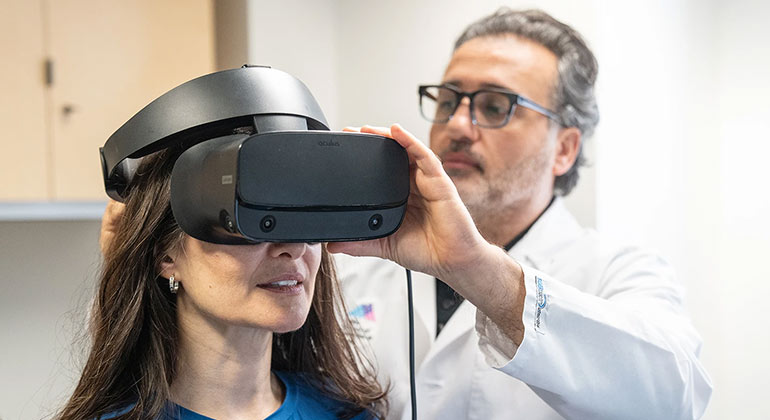
Enhancing Voice Care Through Virtual Reality: A Novel Approach for Professional Voice Users
Individuals with occupations requiring high vocal demands are at an increased risk of vocal injury. Studies reveal that teachers, as a prime example of high vocal demand professionals, experience voice disorders at nearly twice the rate of individuals in occupations with lower vocal demands. Recognizing this heightened risk, the Grabscheid Voice and Swallowing Center of Mount Sinai has made professional and performance voice care a central focus of its clinical and research initiatives. This commitment has led to pioneering studies exploring advanced therapeutic interventions, including the use of virtual reality (VR) to enhance voice therapy outcomes.
Leveraging VR in Clinical Laryngology
Voice therapy aims to rehabilitate vocal behaviors and minimize the risk of injury for individuals experiencing or at risk of voice disorders. To improve the efficacy of vocal rehabilitation and ensure skills transfer effectively to real-life scenarios, it is essential to provide sensory feedback during therapy that closely mirrors real-world conditions.
Investigators at the Grabscheid Voice and Swallowing Center are employing immersive VR technology to simulate authentic classroom environments during therapy sessions. This innovative approach aims to bridge the gap between clinical practice and real-life application, providing participants with more realistic auditory and visual feedback.
Recent research led by Dr. Ümit Daşdöğen demonstrates that VR can successfully replicate real-world settings for vocally healthy individuals. The findings indicate that incorporating auditory, visual, and audiovisual sensory inputs significantly influences voice perception and production, supporting the potential of VR-enhanced therapy in improving therapeutic outcomes.
Current Study: “Influence of Virtual Reality on Voice Perception and Production”
The ongoing study, titled “Influence of Virtual Reality on Voice Perception and Production,” aims to determine whether VR-simulated classroom environments can enhance therapeutic outcomes for professional classroom teachers. Approximately 60 K-12 teachers will participate in this research, performing speech tasks in a variety of VR settings that mimic real classrooms with differences in size, acoustics, and digitally generated student presence.
Researchers will conduct detailed acoustic analyses of participants' voices in these environments and gather self-reported perceptions through questionnaires and visual analog scales. This dual approach will provide insights into how VR influences both objective voice production and subjective experiences.
Participant Eligibility and Enrollment
The study is currently enrolling participants for the fall and winter of 2024-25. Eligible individuals must:
- Be professional classroom teachers aged between 24 and 50.
- Have a minimum of two years of teaching experience.
- Have no history of diagnosed voice disorders.
- Possess healthy hearing and vision (corrected vision is acceptable).
For additional information or to enroll, please contact Ümit Daşdöğen, PhD, CCC-SLP at Umit.Dasdogen@mountsinai.org.